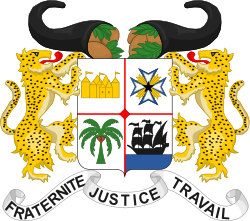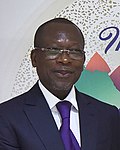Campaigning was only permitted for a 15-day period directly before the elections. The Constitutional Court sanctioned a campaign period from 19 February to 4 March 2016. [7]
Candidates
The Résoatao Party selected its candidate via party primaries held on 7 November 2015; its leader and sole MP Mohamed Atao Hinnouho was chosen with 141 votes, with the president of the party's women's branch Eliane Saizonou receiving 14 votes and the party's first councillor Félix Tohoyessou eight. [8]
Prime Minister Lionel Zinsou announced on 1 December 2015 that he would stand as the candidate of the Cowry Forces for an Emerging Benin, the party of President Yayi Boni, in the 2016 presidential election. He said that he would focus on financing agriculture and helping informal workers obtain formal employment. [9] Zinsou's French background attracted some criticism. At a meeting of a grouping of Zinsou's opponents held on 5 January 2016, a trade union leader denounced Zinsou as "a colonizer" who was "parachuted in ... to safeguard the economic crimes of Boni Yayi". The government defended Zinsou, stressing that he was "a full citizen of Benin" and that arguing that his opponents were appealing to "base instincts of hatred, racism, fear and intolerance." [10]
The Democratic Renewal Party, the third party in parliament led by Adrien Houngbédji, announced on 30 January 2016 that it would support Lionel Zinsou. [11] Independent candidates included the businessmen Patrice Talon and Sebastien Adjavon.
The Autonomous National Electoral Commission (CENA) announced on 13 January 2016 that 48 people had filed the necessary paperwork to stand as presidential candidates, although their candidacies still needed to be approved by the Constitutional Court. [12] Each candidate had to submit health certificates that prove a clean bill of health and deposit a filing fee of an equivalent $25,000. The court cleared 36 candidates and dropped 11 candidates for not providing sufficient evidence for various standard requirements. Three further candidates dropped from the race prior to the allocated campaigning period. [6]


